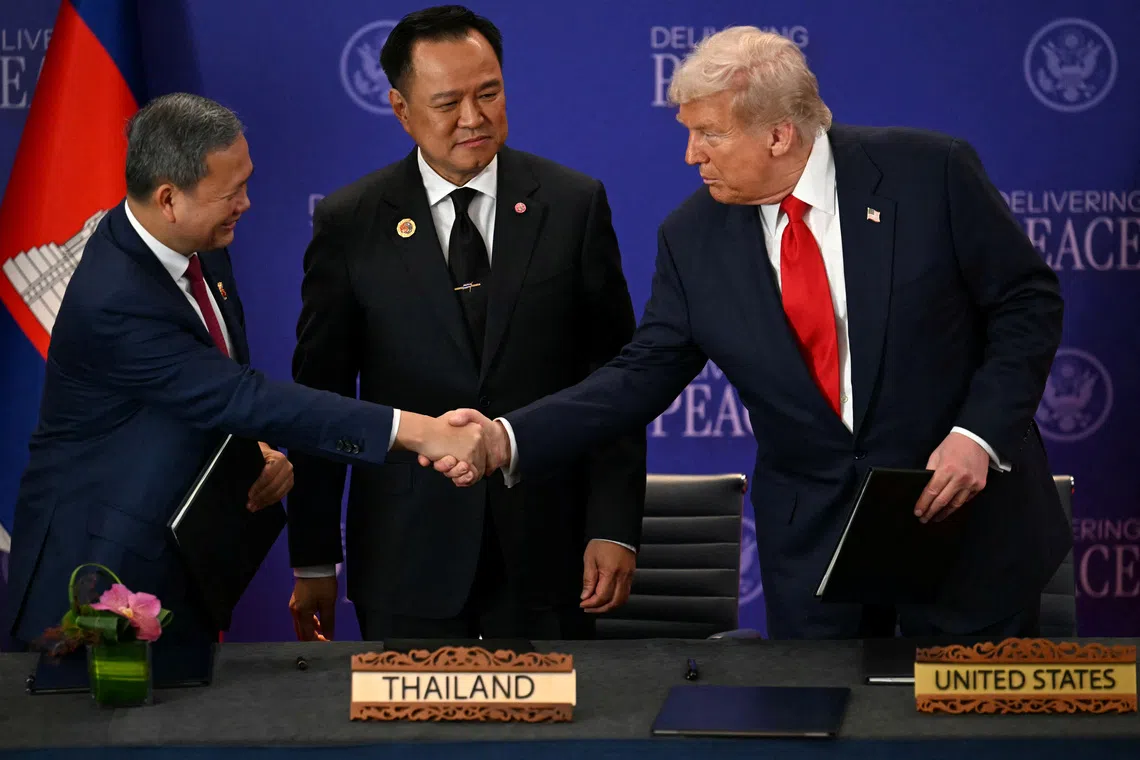News analysis
Thai-Cambodian ‘peace accord’ may be Trump-centric but could prove to be more than just optics
Sign up now: Get insights on the biggest stories in Malaysia

(From left) Cambodian Prime Minister Hun Manet, Thai Prime Minister Anutin Charnvirakul and US President Donald Trump at the signing of the “Kuala Lumpur Peace Accord” on Oct 26.
PHOTO: REUTERS
BANGKOK/KUALA LUMPUR – If there ever was any doubt over the intended audience for the signing of the “Kuala Lumpur Peace Accord”, the answer came shortly after Thailand’s royal palace announced the death of the Queen Mother Sirikit
With Thai Prime Minister Anutin Charnvirakul forced to urgently curtail his commitments at the 47th Asean Summit in the Malaysian capital to attend the Queen Mother’s funeral procession in Bangkok, backup plans had been in place for Thai Foreign Minister Sihasak Phuangketkeow to deputise if US President Donald Trump was unable to accommodate the signing ceremony
In other words, the attendance of Mr Trump was non-negotiable, and of greater importance than the leader of a country ostensibly putting pen to paper to end military hostilities with a neighbouring country.
That is not to say the outcome was of little substance – quite the contrary. While Mr Trump, the self-styled “president of peace”, was able to partake in a victory lap while soaking in the plaudits, the event provided impetus for both the leaders of Thailand and Cambodia to meet and consolidate the progress that has been made – mostly through direct bilateral negotiations – since a July 28 ceasefire
Cambodian Prime Minister Hun Manet said the occasion marked a historic and profound moment for the two countries that reaffirmed “our shared conviction that peace is always possible when nations have the courage and wisdom to pursue it together”.
“As we speak, I think our two commanders are discussing the possibility of the start of withdrawal, partial withdrawal, of the first phase of heavy weapons,” he said.
Expressing gratitude for Mr Trump’s “decisive leadership” and “steadfast commitment”, Mr Hun Manet drew applause from the room when he mentioned Cambodia’s nomination of Mr Trump for the Nobel Peace Prize.
Mr Anutin, dressed in a sombre black suit and tie, concurred that both sides had agreed to promptly remove heavy weapons from the border area to build confidence and trust, and that Thailand would also begin the process of releasing 18 detained Cambodian soldiers. He said the day marked a new chapter in bilateral relations and a “concrete step towards peace”.
“We have come a long way since agreeing to the ceasefire here in Malaysia on July 28, the discussions since then have led to this important outcome,” Mr Anutin said. “I believe we can achieve what seemed beyond reach a few months ago.”
The goodwill on both sides is predicated on commitments made during bilateral negotiations earlier in October to withdraw heavy weaponry from the border, as well as agreements on de-mining operations, efforts to deal with scam syndicates, and conduct a joint survey of the border.
Speaking at a press conference after the ceremony, Mr Sihasak, the Thai Foreign Minister, said the fact that the two neighbours’ commitment to peace was made publicly – and with the US and Malaysia as witnesses – meant it would translate to a tangible difference to the reality on the ground.
“At the level of leadership, we have made it known we are looking to make our ties even better,” he said. “This was in front of two friends and the press. I am confident both sides are under obligation to implement what we have agreed.”
While the extent to which Mr Trump can claim credit for what he said are the eight (and counting) wars he has helped to end varies wildly, the Thailand-Cambodia conflict, which ignited amid simmering tensions over longstanding border disputes and led to at least 43 deaths, has always been one of his stronger cases.
Mr Trump threatened to halt trade deal negotiations with both countries unless fighting stopped, which turned out to be an opportune circuit-breaker that helped provide an off-ramp to de-escalate what threatened to be a spiralling conflict.
“It was amazing the way it came together very quickly,” Mr Trump said of the July ceasefire. “And we worked long hours. It was not long days, because the days were few in number, but the hours were very long and very intense.”
International arbitration over their border dispute has favoured Cambodia in the past, prompting Thailand, with the stronger military, to be more reluctant towards outside intervention. During his press conference, Mr Sihasak said Mr Trump played a role in reaching the initial ceasefire and helped both countries understand each other’s positions, but emphasised that much of the subsequent progress came from direct bilateral negotiations.
The Anutin government has said the Trump administration had continued to use trade negotiations as leverage to demand Thailand and Cambodia sign their peace declaration. Without downplaying the US role, Thailand has also pushed back on the wording of the agreement as being a peace deal, with Mr Sihasak pointing out the official title of the agreement being a joint declaration between the two governments.
“I would call it the pathway towards peace,” Mr Sihasak said, when asked if he would call it a peace deal.
Alongside the peace deal, Mr Trump also signed a reciprocal trade agreement with Cambodia and Malaysia, and a framework on trade negotiations, as well as a memorandum of understanding on critical minerals with Thailand. He also announced a similar trade framework with Vietnam.
While full details of the agreements were not immediately clear, according to a joint statement released by the White House on the Cambodia trade deal, Phnom Penh would eliminate tariffs on all US industrial goods and food and agricultural products, and the US would maintain its 19 per cent tariffs on Cambodian exports, an apparent restatement of previous commitments made during earlier rounds of tariff negotiations.
The joint statement on the framework with Thailand references the elimination of tariff barriers on about 99 per cent of US goods, “covering a full range of US industrial and food and agricultural products”, while reiterating Washington’s 19 per cent tariffs on Thai exports. The White House also announced enhanced cooperation and information sharing between US and Thai law enforcement to advance joint investigations of cyber and financial crimes associated with scam centres.
At the ceremony on Oct 26, the Thai and Cambodian prime ministers shook hands and signed their joint declaration in front of a blue backdrop filled with huge lettering that read “Delivering Peace”. The pair, as well as Malaysian Prime Minister and Asean chair Anwar Ibrahim, rose to speak at a podium with the US presidential seal. Further emphasising the Trump show was the conspicuous absence of China, which had been an “active participant” in the initial July 28 ceasefire agreement.
Mr Chansambath Bong, a research fellow at Cambodian think-tank Asian Vision Institute, said the accord was a net positive for all parties involved.
“President Trump will get the high-profile photo op he wants as a self-proclaimed ‘president of peace’, while Malaysia, as the 2025 chair of Asean, gets to showcase its diplomatic credentials as an honest broker by making the accord possible,” he said.
While it may encourage both Cambodia and Thailand to avoid renewed hostilities, Mr Chansambath Bong added that the success of the accord would depend on the actual implementation of the most recent General Border Committee and Joint Boundary Commission meetings to remove heavy weapons and conduct joint surveys, as well as the deployment and findings of an Asean observer team as an independent monitor.
Some experts, however, were more sceptical of longer-term border issues being fully resolved.
International relations expert Lam Choong Wah of the University of Malaya was doubtful Mr Trump’s involvement would achieve lasting peace.
“The territorial dispute is still ongoing as there has been no full disengagement between the Thai and Cambodian armies,” Dr Lam said. While Bangkok and Phnom Penh were willing to accommodate Mr Trump for “public relations purposes”, he questioned the absence of China, which remains a major influence on both countries.
Additional reporting by Shannon Teoh and Lu Wei Hoong



